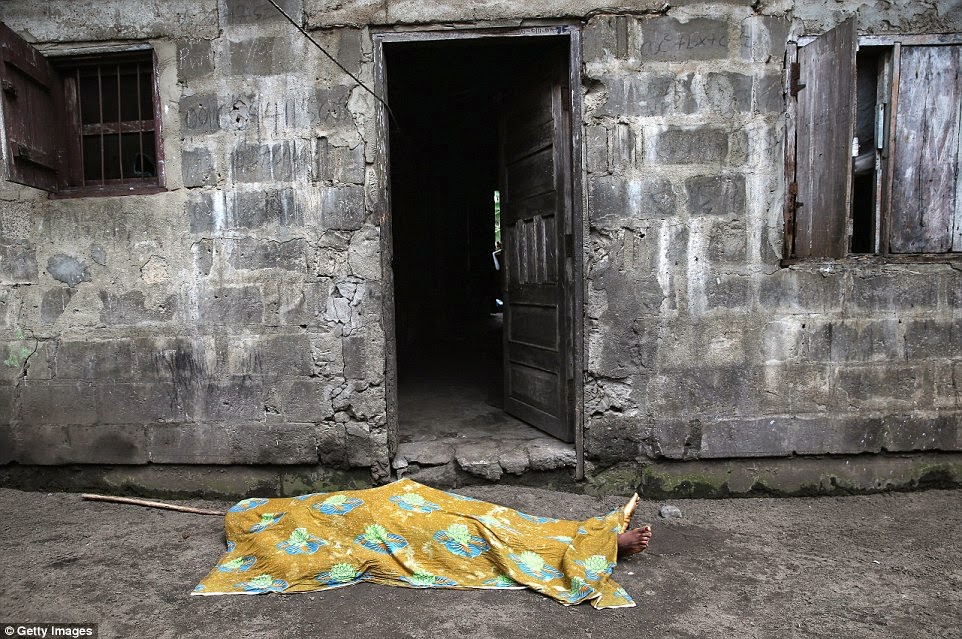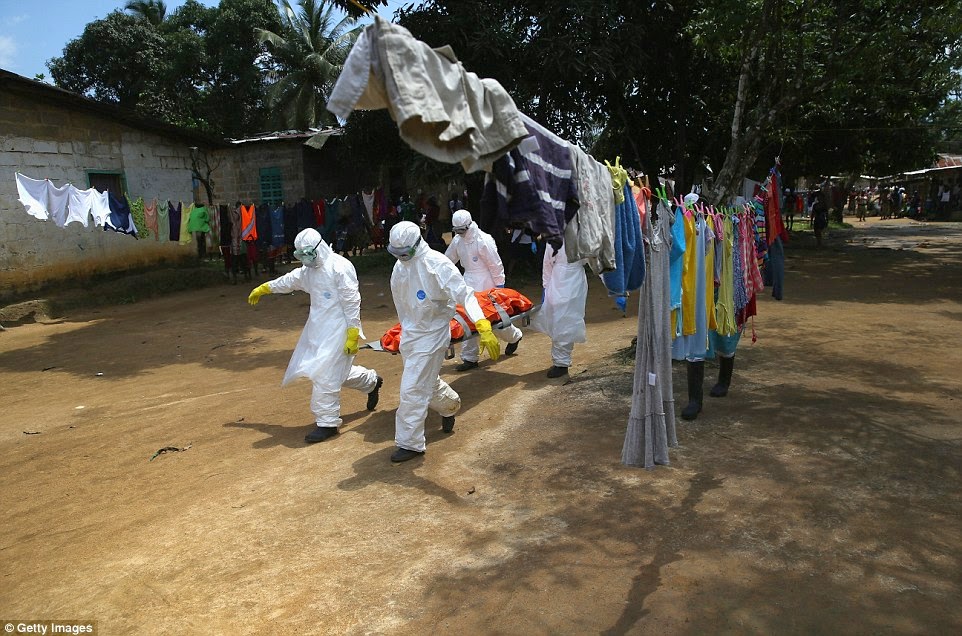It has claimed the lives of more than 4,000 people across the world so far. Now, a series of photos has captured the grim reality of the Ebola outbreak in Liberia, West Africa. The shocking images, taken by photographers John Moore and Mohammed Elshamy, show the brutal effects of the virus on victims and their loved ones. One features a woman crawling desperately toward the body of her sister as a burial team carries it away for cremation on Saturday, while another shows the victim's mother and young daughters weeping as they come to terms with their loss.
In one image, Varney Jonson, 46, is seen crying out in pain as crews - donning white overalls, gloves and goggles - transport the body of his wife, Nama Fambule, to a crematorium following a year-long illness that he insists was not Ebola-related. As the proper burial of loved ones is so important in Liberian culture, the removal of infected bodies for incineration is all the more traumatic for surviving family members. Many relatives attempt to convince burial teams to leave the bodies behind by claiming they were struck down with another illness. Meanwhile, in another photo, a woman is pictured clinging on to a grieving relative as she wails loudly while lying on the ground next to a body truck. Other photos in the series show the body of Ebola victim Mekie Nagbe, 28, lying outside a house wrapped in a blanket, a masked Liberian policeman keeping an eye on grief-stricken crowds and crews removing the body of a four-year-old girl from a one-room apartment in Monrovia. Mr Moore and Mr Elshamy spent weeks working on the front lines of the fight against Ebola in a bid to document the gut-wrenching effects of the virus.
On Friday, the World Health Organization announced the Ebola death toll is now 4,033. This brings the total number of confirmed and suspected cases of Ebola to 8,399. Most cases were recorded in Liberia, Guinea and Sierra Leone. The Centers for Disease Control and Prevention said that people exposed to the virus develop symptoms - including a high fever, vomiting, a headache, joint and muscle aches, a sore throat and general weakness - two to 21 days after their exposure. The U.N. special envoy for Ebola, David Nabarro, explained the number of cases is probably doubling every three-to-four weeks and warned that it will be impossible to quickly combat the disease without mass mobilization of international support. Liberian army soldiers and American troops are currently building an Ebola treatment center in Tubmanburg, Liberia, the first of 17 to be built nationwide, as part of the U.S. response to the epidemic. Meanwhile, Unicef and partner agencies are distributing Ebola protection kits to help Liberian families avoid contracting the virus from sick loved ones in their homes, before they can get an open bed at an Ebola treatment center.
It comes as an NBC news crew that was exposed to a cameraman with the deadly virus has been forced to undergo a mandatory quarantine. The group, which includes chief medical correspondent Nancy Snyderman, had been asked to isolate itself for 21 days after their colleague Ashoka Mukpo was diagnosed with Ebola this month. But someone in the NBC crew violated the voluntary agreement forcing New Jersey officials to step in and issue a mandatory quarantine order on Friday night. Officials confirmed that the order went into effect yesterday. Yet, the state Health Department said that the crew remains symptom-free and there is no reason for concern of exposure to the deadly virus to the community. The group was reporting on the Ebola outbreak for NBC News in Liberia when Mukpo was diagnosed with the deadly virus just a day after he was hired to work on the team. The cameraman was infected in West Africa, but is being treated in Nebrask.
Earlier this week, Thomas Eric Duncan - the first person to be diagnosed with Ebola in the U.S. - died in hospital in Dallas, Texas. The 42-year-old had contracted the virus in Liberia.












